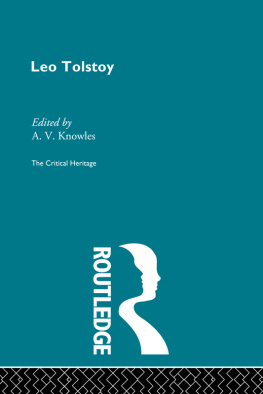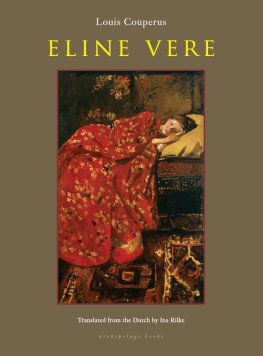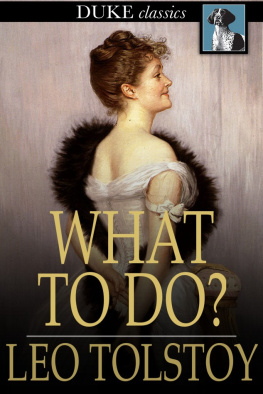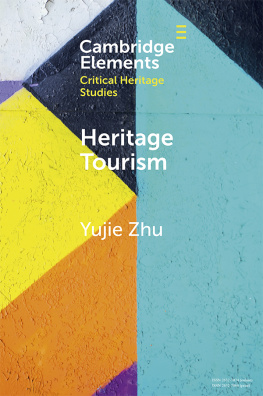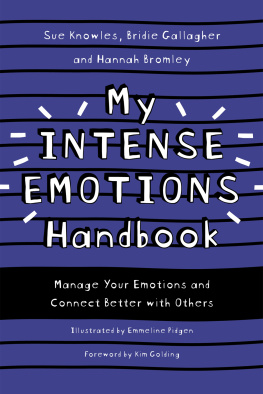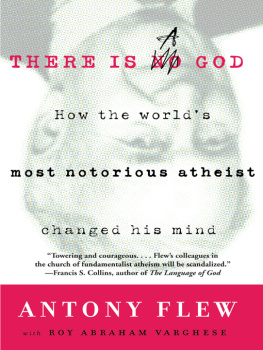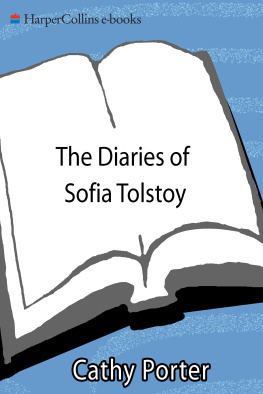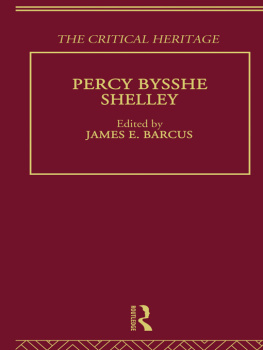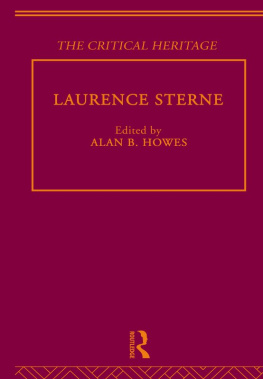Knowles Antony Vere - Leo Tolstoy : the critical heritage
Here you can read online Knowles Antony Vere - Leo Tolstoy : the critical heritage full text of the book (entire story) in english for free. Download pdf and epub, get meaning, cover and reviews about this ebook. City: London, New York, year: 1997, publisher: Routledge, genre: Detective and thriller. Description of the work, (preface) as well as reviews are available. Best literature library LitArk.com created for fans of good reading and offers a wide selection of genres:
Romance novel
Science fiction
Adventure
Detective
Science
History
Home and family
Prose
Art
Politics
Computer
Non-fiction
Religion
Business
Children
Humor
Choose a favorite category and find really read worthwhile books. Enjoy immersion in the world of imagination, feel the emotions of the characters or learn something new for yourself, make an fascinating discovery.
- Book:Leo Tolstoy : the critical heritage
- Author:
- Publisher:Routledge
- Genre:
- Year:1997
- City:London, New York
- Rating:5 / 5
- Favourites:Add to favourites
- Your mark:
- 100
- 1
- 2
- 3
- 4
- 5
Leo Tolstoy : the critical heritage: summary, description and annotation
We offer to read an annotation, description, summary or preface (depends on what the author of the book "Leo Tolstoy : the critical heritage" wrote himself). If you haven't found the necessary information about the book — write in the comments, we will try to find it.
Leo Tolstoy : the critical heritage — read online for free the complete book (whole text) full work
Below is the text of the book, divided by pages. System saving the place of the last page read, allows you to conveniently read the book "Leo Tolstoy : the critical heritage" online for free, without having to search again every time where you left off. Put a bookmark, and you can go to the page where you finished reading at any time.
Font size:
Interval:
Bookmark:
LEO TOLSTOY: THE CRITICAL HERITAGE
THE CRITICAL HERITAGE SERIES
General Editor: B.C.Southam
The Critical Heritage series collects together a large body of criticism on major figures in literature. Each volume presents the contemporary responses to a particular writer, enabling the student to follow the formation of critical attitudes to the writers work and its place within a literary tradition.
The carefully selected sources range from landmark essays in the history of criticism to fragments of contemporary opinion and little published documentary material, such as letters and diaries.
Significant pieces of criticism from later periods are also included in order to demonstrate fluctuations in reputation following the writers death.
LEO TOLSTOY
THE CRITICAL HERITAGE
Edited by
A.V.KNOWLES

First published in 1978
11 New Fetter Lane
London EC4P 4EE
&
29 West 35th Street
New York, NY 10001
This edition published in the Taylor & Francis e-Library, 2002.
Compilation, introduction, notes and index 1978 A.V.Knowles
All rights reserved. No part of this book may be reprinted or reproduced or utilized in any form or by any electronic, mechanical, or other means, now known or hereafter invented, including photocopying and recording or in any information storage or retrieval system, without permission in writing from the publishers.
British Library Cataloguing in Publication Data
ISBN 0-415-15906-7 (Print Edition)
ISBN 0-203-19847-6 Master e-book ISBN
ISBN 0-203-19850-6 (Glassbook Format)
General Editors Preface
The reception given to a writer by his contemporaries and near-contemporaries is evidence of considerable value to the student of literature. On one side we learn a great deal about the state of criticism at large and in particular about the development of critical attitudes towards a single writer; at the same time, through private comments in letters, journals or marginalia, we gain an insight upon the tastes and literary thought of individual readers of the period. Evidence of this kind helps us to understand the writers historical situation, the nature of his immediate reading-public, and his response to these pressures.
The separate volumes in the Critical Heritage Series present a record of this early criticism. Clearly, for many of the highly productive and lengthily reviewed nineteenth- and twentieth-century writers, there exists an enormous body of material ; and in these cases the volume editors have made a selection of the most important views, significant for their intrinsic critical worth or for their representative quality perhaps even registering incomprehension!
For earlier writers, notably pre-eighteenth century, the materials are much scarcer and the historical period has been extended, sometimes far beyond the writers lifetime, in order to show the inception and growth of critical views which were initially slow to appear.
In each volume the documents are headed by an Introduction, discussing the material assembled and relating the early stages of the authors reception to what we have come to identify as the critical tradition. The volumes will make available much material which would otherwise be difficult of access and it is hoped that the modern reader will be thereby helped towards an informed understanding of the ways in which literature has been read and judged.
B.C.S.
Contents
Preface
Much of the contemporary response to Tolstoys fiction, especially in his own country, was ephemeral and not unduly enlightening, some of it was not without interest, but only a little of it was of any lasting merit. Because of this, when we read what his contemporaries had to say about him we learn, ostensibly at least, far more about the state of nineteenth- and early twentieth-century literary criticism than we do about Tolstoy the writer. That is not to say, however, that the seeds of what was to become the main growth of Tolstoyan criticism are entirely absent; but many of them are in general so well concealed by extraneous wrappings, instructions, exhortations, denunciations and words of caution that they are not readily exposed to the light of day.
The amount of critical comment written in Tolstoys lifetime is immense; even the early trilogy, Childhood, Boyhood and Youth, received well over one hundred reviews and notices; and once he had become well known all the critics, and indeed everybody who was anybody (and many more who were not), felt obliged to put pen to paper. Such a vast amount of criticism presents serious problems to an editor of a volume in the present series; consequently some sort of fairly arbitrary limitation has had to be imposed on the selection. In the first place it would be foolish of me to claim to have read everything that appeared, and this sets some limitation at the outset; second, much of it is so lacking in any, even negative, value that it has been rejected out of hand; third, a large proportion of it is hardly more than a recapitulation of the text, or of what fellow-critics wrote, and this has also been excluded. The final choice therefore has been restricted primarily to criticism of Tolstoys works of imaginative fiction; consequently there is little comment on his writings of a political, social, religious, publicistic, or educational nature per se, or his views on art and literature, or on his plays and ideas about the drama. I have started with a number of opinions on his early works, as these had their influence on the reception of the major novels; the main body of the selection is concentrated on the reception of War and Peace and Anna Karenina, and then there is a number of the later, more general, comments. Within this selection I have included a few words from some of Tolstoys fellow-writers, for in some respects, despite their brevity, they are among the most perceptive; I have also attempted to give fair coverage to Tolstoys reception outside Russia. Within the obvious limitations of such a scheme, it is to be hoped that a reasonably well-balanced picture of the contemporary response will clearly emerge.
Finally I owe Tolstoy an apology. He would without doubt have hated this book.
Acknowledgments
I would like to thank Professor R.F.Christian (University of St Andrews) for the initial suggestion that I should undertake this book; Professor Miriam Allott (University of Liverpool) for her kind encouragement; the staff of the Harold Cohen Library (University of Liverpool) for their assistance on many matters, and especially Miss Joan M. Lea of the inter-library loan department for her cheerful optimism and quiet efficiency; the Lenin Library, Moscow, USSR, for their willingness to make material readily available to me; the British Library in London and Boston Spa; my colleague in the Department of Russian, University of Liverpool, Mr R.M.Davison, for his help and understanding; and Mrs Doris Haughton who typed much of the manuscript.
Every effort has been made to obtain permission from the copyright holders to reprint material, and for such permission I wish to thank the following: the Estate of Maurice Baring for an extract from his book Landmarks in Russian Literature (No. 86); William Blackwood & Sons Ltd for an extract from George Saintsburys The Later Nineteenth Century (No. 100) and for C. Whibleys review of Anna Karenina (No. 84); Miss D.E.Collins for an extract from G.K.Chestertons Leo Tolstoy (No. 98); the Editor of the Contemporary Review for part of J.Wedgwoods Count Leo Tolstoi (No. 49); the Estate of Edward Garnett for his Tolstoys Place in European Literature (No. 95); the Editor of the Guardian for part of C.H. Herfords Leo Tolstoy: His Life and Work (No. 104); William Heinemann Ltd and Dodd, Mead & Co. Inc. for an extract from Count Lyof Tolstoi in Critical Kit-Kats by Edmund Gosse (No. 89); J.C.Medley and R.G.Medley, the owners of the copyright, for an extract from George Moores Avowals (No. 52); the Editor of the New Statesman for unsigned comments on Childhood and Youth (No. 13), War and Peace (No. 45), Anna Karenina (No. 80) and Resurrection (No. 97c); Oxford University Press for extracts from The Life of Tolstoy by Aylmer Maude (Nos 9 and 53); the Editor of the Spectator for an unsigned review of War and Peace (No. 47); and the Society of Authors as the literary representative of the Estate of Havelock Ellis for an extract from The New Spirit (No. 91).
Next pageFont size:
Interval:
Bookmark:
Similar books «Leo Tolstoy : the critical heritage»
Look at similar books to Leo Tolstoy : the critical heritage. We have selected literature similar in name and meaning in the hope of providing readers with more options to find new, interesting, not yet read works.
Discussion, reviews of the book Leo Tolstoy : the critical heritage and just readers' own opinions. Leave your comments, write what you think about the work, its meaning or the main characters. Specify what exactly you liked and what you didn't like, and why you think so.

